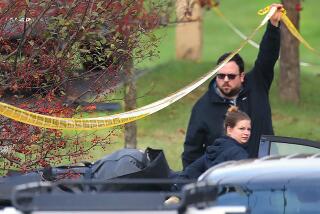Listening to Their Needs
- Share via
BRENTWOOD, Tenn. — The church is silent when the Rev. Brian Sims takes the pulpit for his Sunday sermon. He pauses to make sure all eyes are on him, then raises his hands and begins preaching.
Not a word passes his lips.
“We’re all different,” Sims relates in American Sign Language, “but it doesn’t matter as long as we open our hearts.”
Two deaf women lead the first hymn, which is played on tape for the handful of visitors who can hear. Sims, who also can hear, bangs a bass drum to mark the beat for the others.
The congregation signs the words, fingertips touching palms for “Jesus.” When the music and signing end, a hundred hands wave in silent applause.
While some churches provide signers to help deaf and hearing-impaired worshipers, Brentwood Baptist Deaf Church is among a small but growing number that offer services in sign language with oral translation.
The church is part of Brentwood Baptist Church, which until three years ago used a sign language interpreter for its dozen deaf members. It hired Sims in 1995 to start a full-time ministry to the deaf. Now his church has about 70 members and seven Sunday school classes.
*
Sims can relate to his deaf parishioners. His adoptive parents were deaf, and he grew up signing.
Church deacon Michael Gournaris is deaf. For him, attending a church with a deaf congregation is more spiritual.
“The deaf church has its own culture,” he signs. “For a deaf person to worship in a culture that’s not their church, it’s harder.”
Churches for the deaf are not new. Woodmont Deaf Church, which Sims attended in his hometown of Houston, is one of the nation’s oldest at 75.
In Minneapolis, Bread of Life Evangelical Lutheran Church was built almost half a century ago and was designed to minimize visual distractions. The walls are stark white, with windows at the top to cut glare. A raised platform replaces a pulpit and includes a video screen.
The National Assn. for the Deaf estimates that there are 1,000 or more mainly deaf congregations nationwide for 28 million deaf and hearing impaired Americans. Sims expects the number to grow in Tennessee and elsewhere as more denominations reach out to underserved populations. The National Council of Churches, which includes most major Protestant and Eastern Orthodox religions, has more than a dozen committees for underdeveloped ministries.
“More denominations are now becoming aware of the diversity of people who have been excluded, mostly unintentionally, in the past,” says Beth Lockard, head of the council’s committee on deaf churches. “And that includes the deaf.” She cites statistics indicating that 90% of the nation’s deaf community is unchurched. “If these figures are accurate,” she says, “it shows that deaf ministry has a lot of catching up to do.”
Lockard, who is deaf, is working toward ordination so she can lead the new Christ the King Deaf Lutheran Church in West Chester, Pa.
Janet Clark of Nashville attends Sims’ church. Before she lost her hearing to Legionnaire’s disease, she and her husband attended a Presbyterian church in Nashville.
As her hearing worsened, she moved, pew by pew, closer to the minister. Finally she gave up and tried Brentwood Baptist.
“You can’t worship in a hearing environment if you’re deaf and using sign language,” she says. “The difference is not just in the word itself. It’s in a concept. You can spell out ‘justify’ or ‘sanctify,’ but that doesn’t convey the concept. This is what the deaf had. They could spell it, but they didn’t know what it means.”
To help his congregation understand, Sims uses posters, pictures, even masks. Props include three balloons that he blows up and deflates. His analogy: Hearts are like balloons. Without allowing God in, hearts cannot stay full.
The audience nods, and a few hands rise to sign “amen.” Few worshipers notice girls chattering aloud, unchecked by their deaf mothers. Or the three teenagers in the back who “whisper” by signing low, where their hands can’t be seen.
Lamont Perry peers over his shoulder to eavesdrop. The 17-year-old Nashville resident has attended church on his own for three years, riding in a van that Sims sends to pick up deaf teenagers. His mother, who can hear, worships elsewhere.
Perry said he would stay home if there were no deaf church. “I’d be bored trying to read the Bible myself,” he says.
Gournaris agrees. Without the church, he signs, he would be lost. He shakes his head.
“Lost,” he repeats the sign. “The meaning of life would be lost.”
More to Read
Sign up for Essential California
The most important California stories and recommendations in your inbox every morning.
You may occasionally receive promotional content from the Los Angeles Times.













